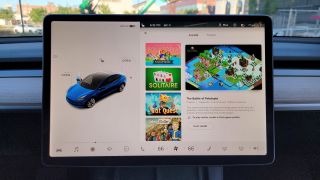At this point, it’s no surprise when Tesla or CEO Elon Musk announces a boundary-breaking feature for its electric vehicles.
Earlier this year, Tesla rolled out the ability for passengers to play video games through the infotainment system mounted on the dashboard even while the car is in motion, which can be activated after the player confirms they are a passenger.
However, there’s nothing to stop a driver from tapping this prompt, too.
Now, Tesla has communicated to the National Highway Traffic Safety Administration (NHTSA) its intent to roll out a software update disabling the feature while the vehicle is in motion.
This comes after reports earlier this week that the agency had opened a preliminary investigation into Passenger Play, following concerns raised by Tesla Model 3 owner Vince Patton (as reported by the New York Times). This probe covers all four Tesla models – the S, X, Y and 3 from 2017 through 2022.

While the availability of games like Sonic 1 created a buzz in gaming and Tesla fans alike, road safety experts and agencies worry that live video and interactive activities on the touchscreen could present safety issues.
Musk has made his love for gaming well-known over the years, so his intent to make Tesla’s infotainment system highly capable of running AAA titles was impressive, but no surprise.
The NHTSA also has already presented a number of investigations this year into touchscreen failures, as well as the performance of Tesla’s self-driving software following consumer complaints.
While we’ve yet to hear anything directly from Musk or representatives for Tesla on this particular prove, the NHTSA’s investigation is the first step in what could be a long journey to reshape how Tesla treats its in-vehicle entertainment system.
Analysis: The long road to innovation
Grand changes to the way we live, work and even drive are not always met with open arms, and it’s safe to say that Tesla is no stranger to skepticism.
That being said, the leaps and bounds of new developments like Tesla’s powerful infotainment and self-driving present warrant caution.
The NHTSA’s early estimates (June 2021) show that an estimated 38,680 people died in motor vehicle traffic crashes in 2020 in the US – the largest projected number of fatalities since 2007. According to road safety charity Brake, 2020 saw 1,516 people were killed on UK roads, with 1,460 deaths recorded in Britain and 56 recorded in Northern Ireland.
Of course, it’s difficult to pin exactly how many of these deaths can be attributed to distracted driving, but earlier statistics from the NHTSA suggested that around 9 per cent of crashes in 2019 were reported as distraction-related.
Self-driving presents the opportunity for distracted driving to have less impact on these statistics – however, as of yet, the technology garners more safety concerns than it solves, judging by the NHTSA’s investigations.
While the future of self-driving cars remains hopeful, it’s safe to say that, for now at least, it’s time to manage expectations, strap on our seatbelts, and shut down the solitaire game we were playing on our infotainment systems while taking a break from the road.
